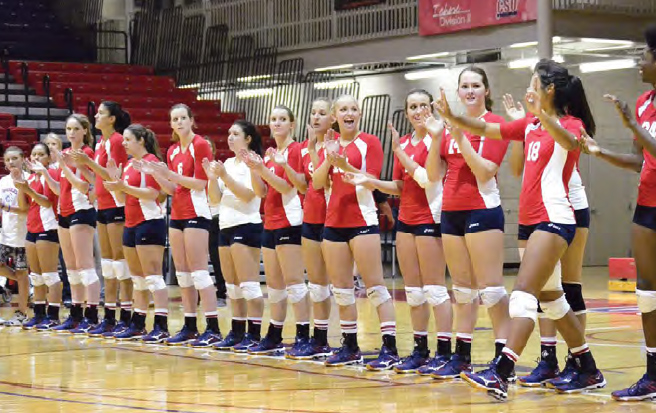| Feeling Smart - Emotional Intelligence |
| By: Jill Muhe - CSU-Pueblo
Originally Published in: Coaching Volleyball Magazine Provided by: AVCA Emotional intelligence is the realization and understanding that we indeed have these emotions, learning how to express them and being able to use them in a positive manner both as coaches and facilitating that understanding between our players. Emotional intelligence is a business leadership theory that was developed around 20 years ago with a predominant amount of research performed in a business and academic setting. It is based on the premise that emotions are present and play a role in our life and that people differ in their abilities to perceive, understand, manage and use them. Recently, emotional intelligence has been embraced in the coaching community from the perspective that there are different traits that have been found in successful business leaders that have also been found in highly successful coaches and vice versa. There are four prongs to emotional intelligence: perceiving emotions, understanding emotions, managing emotions and using emotions. In ways, these areas all overlap, but the most important aspect of this, by and far, is the perception of emotions. Perception creates the foundation - if you can't perceive emotions correctly, then you can't explore the other prongs. Since we know that we all have emotions, how hard can perceiving them re-ally be? Today, we practically spell out how we're feeling by including emoticons in our text messages and emails. In a way, the popular use of emoticons drives home how important perceiving emotions can be. When we text, we've created a way to make a visual cue and give context to text that would otherwise be difficult to derive emotion from. This emphasizes the importance of how valuable expressing our emotions when communicating with others can be. When we talk about perceiving emotions, there are a couple of things that we need to look for. Non-verbal perception makes use of facial expressions, tone of voice and body language. Some of these non-verbal cues are universally obvious to just about everyone - an exasperated tone of voice, sighing, hand gestures, etc. The other component of emotional perception is that we need to not only be self-aware, but be willing to do a self-assessment. One of the more recent trends in the coaching community has been to not only videotape practice and games, but have someone film you while you're coaching in various situations. Then, go back and watch what you're doing while in the act of coaching, teaching and communicating. You'll be amazed at some of the little random things that you notice about yourself that give off some sort of perception. Are you crossing your arms in a way that conveys frustration? Do you silently react to plays in ways that other players might see and interpret? Maybe you have a nervous tic that shows up in pressure situations. When reflecting on what you see yourself doing, also think about how you're feeling and how you're handling what you're feeling. After games, are you calm enough to give the postgame talk in the locker room, or do you need to take three minutes to relax so you can have constructive communication with your team? Forcing communication while emotions are running high might not help you send the message that you want - other times, though, your emotion might help drive home an important point or serve as motivation. It's all about context. Now that we've perceived the emotion, we need to try and understand it. To develop a better grasp on our emotions, we can ask a few questions. Why do we think, feel and behave the way that we do? Why do we react a particular way in certain situations and differently in other situations? The next step is learning to manage emotions. Let's be honest - it's not usually the emotion itself that is the problem; it's the response that gets you into trouble. You likely remember the rant from Oklahoma State football coach Mike Gundy - "I'm a man, I'm 40!" If you actually look at the emotion driving Coach Gundy's response, it was fantastic. He was, after all, trying to protect an athlete that had done nothing wrong and that he felt was being unfairly attacked in the media. Isn't that part of our job as coaches, to protect or defend our athletes? The emotion was appropriate, but it was the delivery of the response that turned that clip into a viral sensation. It's crucial to have self-control and manage our emotions, a component that is built on the perception and understanding of them. Leaders and coaches that can manage their emotions create trust, and trust creates performance. That trust comes from the standpoint that the coach isn't going to fly off the handle unjustly, and the team has an idea how their leader will react to various situations instead of playing in fear. Comfort leads to trust, a chain reaction that results in higher levels of performance. The final aspect of emotional intelligence is the ability to use emotions. This is what we refer to as our social/people skills. How do we take what we've learned from perception, understanding and managing and use that knowledge to make decisions moving forward? This can refer to decisions about how you as an individual are going to behave and decisions on how you're going to lead your team. The use of these emotions in a positive way is what results in inspirational leadership. It's knowing how pumped up to get at the right time with the right player, knowing what each athlete needs in order to be able to play their best. Teams vary, some players will know how to take care of themselves, get themselves prepared to perform their best, and others may need the right style of encouragement to get rolling. The ways that we learn to respond to the emotions of the team can also help with conflict management. From a coach-player standpoint, it's easier to create an empathy situation. How can you express yourself in a way that makes a point effectively instead of creating unnecessary hostility? If two players are at odds, how can you, as a mediator, help them communicate and find a middle ground? Knowing how your players individually react in different situations can help you navigate troubled waters. Helping players understand where someone else is coming from can elevate their emotional intelligence and improve overall communication within the team structure. Developing an emotional foundation for your approach to coaching can provide the balance and stability that your program needs on a yearly basis. Learning about your incoming players and how they fit in with your existing team and staff will keep you on your toes. Making emotional intelligence a priority as you plan for the season will improve communication within your program in ways you may not have expected.
For more insight and thoughts from Coach Muhe, visit www.avca.org/event-seminars and select recording #40 from the 2015 collection! |



 As human beings, we're all aware that we have emotions - it's part of who we are. Over time there has been a variety of viewpoints concerning the place of emotions in the workplace, that we should leave them at the door and almost become a robot. Clearly, we've learned that doesn't really work, it goes directly against our nature. We all experience emotions in different ways and to different degrees - we need to figure out how to use our emotions constructively, productively and perhaps even have them help us out in a number of situations. The truth of the matter is that Aristotle really did have it right; getting angry is okay, as long as you get angry with the right person, for the right reason, at the right time, to the right degree, and using the right language. If you can manage that, getting angry is perfectly fine.
As human beings, we're all aware that we have emotions - it's part of who we are. Over time there has been a variety of viewpoints concerning the place of emotions in the workplace, that we should leave them at the door and almost become a robot. Clearly, we've learned that doesn't really work, it goes directly against our nature. We all experience emotions in different ways and to different degrees - we need to figure out how to use our emotions constructively, productively and perhaps even have them help us out in a number of situations. The truth of the matter is that Aristotle really did have it right; getting angry is okay, as long as you get angry with the right person, for the right reason, at the right time, to the right degree, and using the right language. If you can manage that, getting angry is perfectly fine. Many times, though, these can be a lot more subtle than you think. Your voice can be saying one thing while your body is saying something else. When I'm communicating with someone, I'm trying to use visual cues to give context to what they're saying, and the better that I know the person, more often than not, the better I'll be at perceiving the signals they're sending
Many times, though, these can be a lot more subtle than you think. Your voice can be saying one thing while your body is saying something else. When I'm communicating with someone, I'm trying to use visual cues to give context to what they're saying, and the better that I know the person, more often than not, the better I'll be at perceiving the signals they're sending
 Why do other coaches or players have completely different reactions in the same situation? What tendencies have you developed? Which emotions are difficult for you? Knowing the types of situations that set you off in particular ways is crucial to understanding your emotional habits. There once was a coach that began each season by handing out a list of his pet peeves, certain topics that he found difficult to deal with. If a player came to talk with him about one of those, they were told to begin the conversation with "Coach, we need to talk," which cued him to the fact that the topic was one he was likely to be irritated with and gave him a moment to prepare and discuss it fairly. That same cue also gives the player a tool to use when trying to approach a tricky subject, and eliminates somewhat the fear that they might have about broaching a topic likely to provoke anger or frustration. It makes for an easier bridge into frank and productive discussion.
Why do other coaches or players have completely different reactions in the same situation? What tendencies have you developed? Which emotions are difficult for you? Knowing the types of situations that set you off in particular ways is crucial to understanding your emotional habits. There once was a coach that began each season by handing out a list of his pet peeves, certain topics that he found difficult to deal with. If a player came to talk with him about one of those, they were told to begin the conversation with "Coach, we need to talk," which cued him to the fact that the topic was one he was likely to be irritated with and gave him a moment to prepare and discuss it fairly. That same cue also gives the player a tool to use when trying to approach a tricky subject, and eliminates somewhat the fear that they might have about broaching a topic likely to provoke anger or frustration. It makes for an easier bridge into frank and productive discussion.



